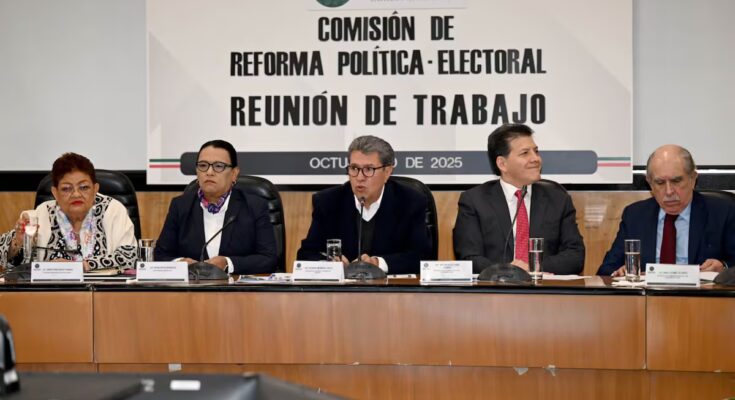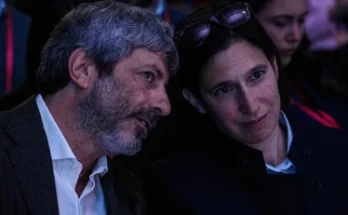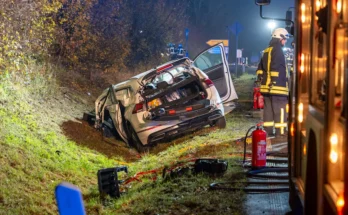Morena’s intention to hold a super-election in 2027 would coincide with the revocation of the mandate promoted by Mexican President Claudia Sheinbaum, with the election of 500 federal deputies, 17 state governments, thousands of city councils and 31 local Congresses, as well as the second judicial election of hundreds of positions and a probable popular consultation. In some entities, voters may receive more than 10 ballots to vote on a mega election day.
These electoral plans, embodied in an initiative of the deputy Alfonso Ramírez Cuéllar (a morenista who positions himself as a close operator of President Claudia Sheinbaum), contradict some of the arguments with which the government has called for consultation forums for an imminent political-electoral reform that would aim, among other things, to make more austere a system that currently costs around 20 billion pesos every year.
Ramírez Cuéllar’s initiative would be pronounced this Monday in the Constitutional Points Commission of the Chamber of Deputies, and then be brought to the plenary session this week, where Morena and his allies from the PVEM and the PT have enough votes to approve it. But the coordinators of the opposition benches asked for more time to analyze the issue, so the ruling was postponed.
The proposal seems simple: to make the date of a possible revocation of the mandate – if called – coincide with that of the 2027 intermediate federal elections and establish that the popular consultation – a mechanism that can be called every year by the citizens or by any of the three powers of the Union – will also take place in June, and not in August, as currently planned.
Both citizen participation exercises had already been put to the test in the previous six-year term, after former president Andrés Manuel López Obrador promoted a constitutional reform that made them possible, but – at the opposition’s request – on different dates than conventional elections. The Popular Consultation, which initially aimed to ask citizens whether they agreed to prosecute former presidents, was held on August 1, 2021, a month after the federal elections that year. Only 6.6 million voters participated, 7.11% of a register of 93 million possible voters. The consultation on the revocation of the mandate was held on April 10, 2022 and was not promoted by López Obrador’s detractors, but by his supporters, so it turned out to be more of a ratification than a revocation. 16.5 million voters participated, equal to 17.7% of the register.
Neither exercise reached the 40% minimum participation required to be binding, so they became symbolic events that Morena and AMLO took advantage of to mobilize their bases.
In both cases, the National Electoral Institute requested additional resources from the Chamber of Deputies to organize the exercise: 1.5 billion pesos for the popular consultation and 3.8 billion pesos for the revocation of the mandate. But the Chamber authorized only 528 million for the consultation and 1,500 million for the revocation, so the 160,000 polling stations required by law to cover all the electoral sections were not installed, but only 57,000 reception tables, which may have influenced the low participation.
One of the arguments of Ramírez Cuéllar’s initiative is precisely the savings that would mean concentrating these exercises of citizen participation in federal and local elections, which currently take place in single polling stations, where it would be sufficient to add the ballots for popular consultation and the revocation of the mandate.
“With a clear legal framework, voting for revocation processes concurrently with other electoral processes can increase citizen participation, save logistical and financial resources, reduce citizens’ electoral fatigue, and improve transparency and citizen control in such political processes. This would undoubtedly enrich such a democratic exercise. In the case of popular consultations, which can be held every year, merging both days on the same date would facilitate logistical organization, optimize public resources and would encourage greater citizen participation, reducing the dispersion of electoral events in the calendar”, states the full opinion awaiting discussion.
If the initiative is successful, the super-elections will be held on Sunday 6 June 2027 and will coincide with five processes currently foreseen by the Constitution: the renewal of the Chamber of Deputies, gubernatorial elections in 17 states (Aguascalientes, Baja California, Baja California Sur, Campeche, Chihuahua, Colima, Guerrero, Michoacán, Nayarit, Nuevo León, Querétaro, Quintana Roo, San Luis Potosí, Sinaloa, Sonora, Tlaxcala and Zacatecas), local congressional elections in all states except Coahuila, elections for the renewal of city councils in 30 entities (all except Durango and Veracruz), and judicial elections in all federal and local circuits and districts that have not been renewed in 2025.
An election of this size will test the electoral system, currently in the crosshairs of a reform process led by Pablo Gómez, who has warned that Morena and his allies will use their majority to approve changes that aim to streamline the current national electoral system, which includes the INE (with decentralized offices throughout the country), 32 Local Public Electoral Bodies (OPLE), an Electoral Tribunal, the Judiciary of the Federation (TEPJF) and 32 State Court Elections.
“The disappearance of the OPLE is evident, no one can say what they are for. The state courts solve nothing, everything goes to the electoral tribunal. It is better to create a two-level system. There are 300 district councils, we have to finish them”, warned Pablo Gómez in an interview with EL PAÍS, last August.
Claudia Sheinbaum on the ballot
But the dilemma of the 2027 super elections is not only technical or financial, but political, since carrying out the revocation of the mandate in that year and not in April 2028 as required by current law, would put President Claudia Sheinbaum on the ballot for the mid-term elections.
This could be the intent of the initiative presented by Alfonso Ramírez Cuéllar last September: to bet on Sheinbaum’s strength in the polls, which give him a approval rating of 70%, in contrast with the wear and tear that Morena has suffered after a year of scandals involving figures such as Adán Augusto López, Gerardo Fernández Noroña, Andrés Manuel López Beltrán (“Andy”), Cuauhtémoc Blanco and some governor actors.
For some specialists, the approval of the dates is a trap that puts the electoral system and democracy itself at risk. “This is not just any fact, but an initiative that has the consensus of those who, under the pretext of being evaluated and ratified by the people, seek to use their influence, their power and the resources of the state to influence the 2027 elections,” says the former executive secretary of the INE, Edmundo Jacobo Molina.
With 15 years of experience at the helm of the Executive Secretariat of the INE – the most important technical area of the electoral system -, Molina assures that combining the revocation of the mandate with the federal and local elections, and the judicial election of 2027, would imply a point of no return in the Morenist intention to perpetuate himself in power.
For his part, MP Germán Martínez, deputy of the PAN parliamentary group, stated that the opposition does not fear President Sheinbaum’s participation in the run-off in 2027, as long as there are clear rules that guarantee free and authentic elections, which will depend on the electoral reform that the majority in power will end up imposing in 2026.
“This initiative by Ramírez Cuéllar is a corner of Pablo Gómez’s reform, which shows an internal struggle. But beyond this struggle, what we ask is that there are electoral rules that give guarantees to an impartial authority. We are not afraid of the vote and the free and authentic expression of citizens, nothing more than we want free and authentic elections, free from crime and public money, without conditioning social programs. Take money from the INE and have mega-elections it is a contradiction. The PAN is not afraid of elections, it is afraid of simulation,” the PAN deputy said in an interview with EL PAÍS.
Ramírez Cuéllar, however, assures that his initiative is part of a global package of reforms that aim to strengthen responsibility in Mexico and which include the elimination of jurisdiction, the reconstruction of the figure of the Auditor, the reform of the Union Congress and the Federal Public Administration. The discussion of the opinion on this initiative, which should have been held this Monday, was postponed indefinitely at the request of the opposition, in a meeting of the Political Coordination Council in which the Morenoist coordinator, Ricardo Monreal, agreed to allow more time for the debate.



